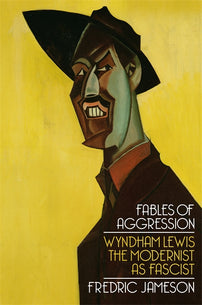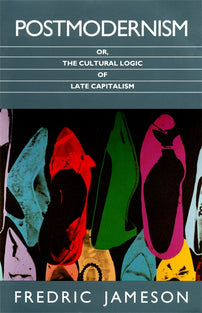On Fredric Jameson's Fables of Aggression: Jameson at 90
Fredric Jameson was born 90 years ago today. To mark the occasion, Ian Buchanan explores Jameson's inimitable "immunity to boredom" through his 1979 book, Fables of Aggression.

Jameson once told me that, whatever the relative merits of Fables of Aggression might be, it had failed in one respect. He had never been able to persuade anyone that they should read Wyndham Lewis. Not even when he went to the trouble of giving people copies of Lewis’s novels. After that conversation, ashamed of my own status as a non-reader of Lewis, I ordered a pile of Lewis’s novels, but, I confess, I never managed to get through even one, and several remain uncracked. This was at a stage in my career (I had just finished my PhD), too, when I was actively making long lists of books I hadn’t read – many of them culled from the bibliographies of Jameson’s books – that I then tried to plough through, regardless of whether they were to my taste. Often, they weren’t. In this fashion, I got through several Stendhals and Balzacs, a handful of Conrads, not to forget a generous sampling of Gissings, but Lewis defeated me.
As a side note here, let me say one of the things I have always admired about Jameson is his apparent immunity to boredom in the face of what he calls here “plotless art novels” – the same could be said for his capacity to watch similarly plotless art movies. As testament to this veritable superpower Jameson is depicted as a marathon movie watcher in the author notes for the SAQ issue on sport which includes pictures of all the authors engaged in their favourite sport. I was quietly gratified to note his admission of defeat with Apes of God, which he describes as “virtually unreadable for any sustained period of time” (5). The closest I ever got to finishing any of Lewis’s books was The Revenge for Love (his best novel, according to Jameson [145]) but the rest sit there on the shelf gathering dust like tombstones.
[book-strip index="1"]
And, in a way, that is precisely what they are, they mark out a forgotten corner of the graveyard of modernism that has sunk into the weeds. As such, like most people, I have never read Fables of Aggression as intended because Lewis is unknown to me, except by reputation. Instead, I have always read it as (i) an early entry into the constantly expanding universe of Jameson’s writing (on which point I’d like to note – complain – that my book on Jameson, which was published in 2006 and endeavoured to be comprehensive, is now out of date by at least 10 books!); and, (ii) as a tour de force of Jameson’s critical method.
Fables of Aggression anticipates The Political Unconscious in several ways, and it is my sense that people who read the latter feel they don’t need to read the former because it covers similar territory. While this is true, to a certain extent, it is far from the whole story. While a case could be made for combining the two books, this would mute the ways Fables of Aggression goes well beyond the territory covered by The Political Unconscious and anticipates several key elements of Jameson’s future work, of which I will list three: (i) it maps out the framework for the concept of national allegory that would gain such infamy in his essay on Third World Literature; (ii) it signals an interest in a unified theory of science fiction and utopia, which he finally delivered 28 years later in The Archaeologies of the Future; (iii) and, perhaps most strikingly, it anticipates the work for which he is undoubtedly best known, namely his critique of postmodernism.
Jameson knew that no one much read Lewis anymore when he set out to write Fables of Aggression. In the prologue, pointedly entitled “On Not Reading Lewis” Jameson more or less says the only reason Lewis isn’t cancelled today (i.e., in 1979, when of course the word ‘cancelled’ wasn’t yet in use) is because no one actually reads him anymore. He acknowledges that Lewis’s reputation for misogyny and fascist sympathies is well deserved, but also notes in the appendix that his anti-Nazi convictions are “impeccable” (183). Jameson’s claim as to why he should be read goes to the heart of his method, which, I daresay, is one of the least noticed aspects of his approach to the written word. He is a great admirer and exponent of the sentence. He describes Lewis’s style in terms of the different sentence-producing machines he creates, and it is clearly this aspect of Lewis’s work that he finds energizing and worth theorizing.
[book-strip index="2"]
In order to theorize Lewis’s style, he turns to Deleuze and Guattari’s (then) recently published Anti-Oedipus, which was fashionable in Paris at the time but not well known in the US. As far as I can tell, Fables of Aggression is the first book of literary criticism, if that is the right word, to wrangle with Anti-Oedipus, a book that makes great use of, but does not theorize literature. It was for this reason that I invited Jameson to Australia to keynote a Deleuze conference I organized in 1996. Many people queried my choice of speaker, citing a handful of local Deleuze scholars as better choices, but, as I explained to anyone who cared to listen, Jameson is the true pioneer of field. He was among the first to recognize Deleuze and Guattari’s importance and he played an important role in ensuring their work was translated and became better known in the Anglophone world. This is not to say he is uncritical of their work, far from it.
Jameson adopted two ideas from Anti-Oedipus. At the structural level of his overall approach to Lewis, he adopts the notion of an immanent way of reading – The Political Unconscious follows the same model. At the conceptual level, it deploys Deleuze and Guattari’s binary of the molar and the molecular, arguing that Lewis uses relatively conventional narrative structures (the molar) to contain the explosion of creativity unleashed by his sentences (the molecular). It has always puzzled me that Jameson didn’t retain this model in his later work because it works well in relation to his arguments concerning postmodernism and its custom made for his much later work on realism.

